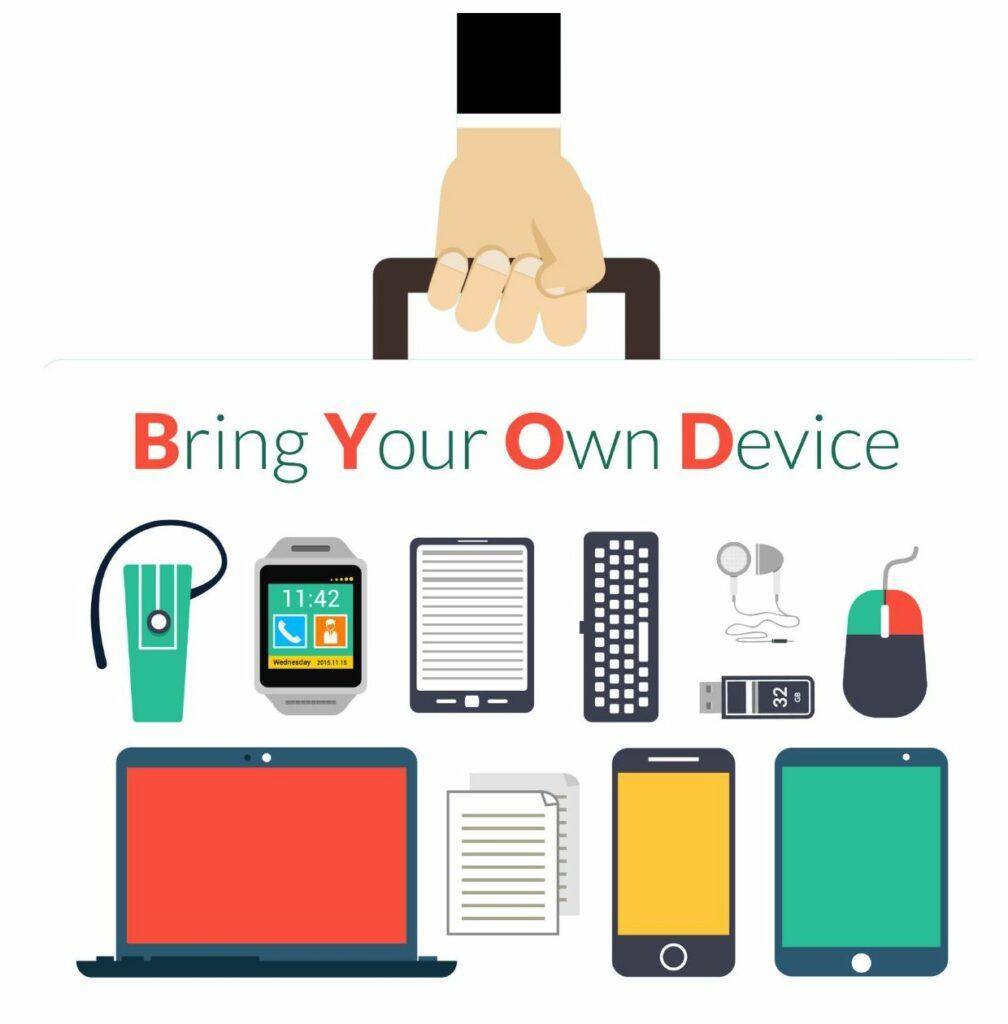Table of Contents
ToggleBYOD (Bring Your Own Device): Advantages and Disadvantages and Risks
What is a BYOD (Bring Your Own Device) Policy?
BYOD (Bring Your Own Device) Policy is a popular way to provide employees with devices and internet access for working from home, but there are some disadvantages to this approach. Some of the cons of BYOD include increased cost for the employer, security risks and privacy issues for employees. In order to offset these downsides and implement a successful BYOD program in your Organization, you will need to establish effective Policies, Procedures and best practices that cover all aspects of this arrangement.
BYOD (Bring Your Own Device) is a Policy that allows employees to use their personal devices for work purposes. This is generally done via an app or by logging into the Company’s web portal from the employee’s phone or computer.
BYOD policies have been adopted by many companies because they make it easier for employees to access information on the go and improve productivity, which are both valuable benefits of BYOD. However, these policies can also present risks for employers if not implemented correctly. Let us look at the pros and cons of BYOD (Bring Your Own Device) Policy.
Pros Of BYOD (Bring Your Own Device) Policy:
- Allows Employees To Use Their Own Devices: One of the biggest advantages of a BYOD Policy is that it allows employees to use their own devices rather than having to have them provided by the Company. This can be useful in many different situations, including allowing employees to work from home and providing them with flexibility.
- Allows Employees To Work From Home: Another advantage of using your own device is that it lets you work from home if necessary or desired by both parties (you and your boss). Employers can also choose whether or not they want an office space at all if all employees follow BYOD Policy.
- Helps Reduce Costs: One of the biggest advantages of a BYOD Policy is that it helps reduce costs for the employers. Rather than having to purchase expensive devices and software licenses, employees can use the equipment and softwares that they already own. This also reduces the amount of time spent setting up each device.
- Allows Employees To Be More Productive: Another advantage is that employees who have their own device tend to be more productive than those who don’t. When you have a device that’s specifically designed for work and the tools you need to do your job, it’s easier to stay focused on your tasks.
- Allows Employees To Have More Flexibility: A BYOD Policy can also provide employees with more flexibility in their workday. Rather than being tied down by office hours, they can access files at any time from anywhere.
Cons of BYOD (Bring Your Own Device) Policy:
- BYOD is costly for companies: The biggest drawback to BYOD is that it costs businesses a lot more money than traditional policies. When employees have their own device, they aren’t required to buy one with Company funds. That means companies need to pay for the support when something goes wrong. Employers may need to purchase genuine software licenses if an employee’s device does not have the required softwares to perform their duties.
- BYOD may lead to data loss and security breaches: If a Company doesn’t have control over the devices that employees use, they may be exposed to malware or other forms of malicious software. The employee could also lose their device, which would result in loss of sensitive files and sensitive information.
- BYOD can be an invasion of privacy: In some cases, the employer may ask for access to the device in order to make sure that it is being used correctly. This could result in an invasion of privacy and could lead to discrimination against certain employees.
- BYOD can be difficult to manage: If the employer doesn’t have control over the device, they may have difficulty managing it. This could result in lost productivity due to a lack of security controls and effective management tools.
What are the privacy and security concerns of BYOD?
While it is possible to implement and enforce a BYOD Policy, there are some security concerns you should be aware of.
- Employees may be more likely to use their personal devices for work purposes because they’re familiar with their devices, and it’s much easier to use these devices than having to purchase a new one just for work. However, this can lead to the device getting infected with malware or spyware which could then infect your Company’s network.
- There is also the possibility that employees will use their personal devices for personal use while on the clock at work—for example, texting friends or playing games in between appointments with clients. This could result in decreased productivity levels and affect your Organization negatively if they’re not paying attention while working.
Also consider these additional factors:
- Employee privacy – Some people do not feel comfortable using their personal devices at work because they do not want any information stored on those devices being used against them by employers (i.e., photos taken without permission). Privacy is something that needs to be respected by both parties and employees should feel comfortable using technology in the workplace without any worries of their personal information being used against them.
What are the best practices of home working and BYOD?
The best practices of BYOD include:

- Only allowing employees to work from home if it is the best option for their particular situation.
- Defining whether or not your Organization has a BYOD Policy and what it entails. If you do, it will help with employee understanding and expectations of how they should use their device for business purposes versus personal ones.
- Establishing clear guidelines about how much personal use is allowed during work hours, as well as outlining disciplinary actions if an employee exceeds those limits.
BYOD (Bring Your Own Device) Policy seems attractive for employees in work from home situations, but employers need to be aware of all the disadvantages that go with it.
Conclusion
The BYOD Policy is attractive for employees in work from home situations, but employers need to be aware of all the disadvantages that go with it. When working from home, protecting yourself from cyber attacks is extremely important. To know more on how to remain safe from cyber attacks read our article titled: Protecting Yourself from CyberAttacks While Working From Home During Covid-19 Pandemic.
FAQs:
What are the disadvantages of BYOD in a workplace?
BYOD has various disadvantages. The most common one is that it leads to security issues, as the use of personal devices means that employees have access to a wide range of personal data. Another issue is that BYOD might cause problems with IT support in case something goes wrong with the device or its software.
What are the advantages and disadvantages of allowing employees to use their personal mobile devices for work?
One of the major advantages of allowing employees to use their personal mobile devices for work is that it can make them more productive. This is because they will be able to work outside of the office (for example, while travelling on business trips), which means that they do not have to wait until they return home before getting some work done. Disadvantage of allowing employees to use their personal mobile devices for work is that it can create security risks. This is because the Company may not have control over the devices and its contents, which means that confidential information could be leaked to third parties.
What are the challenges of BYOD?
The main challenge of BYOD is that it can be expensive for companies. This is because they will have to ensure that all employees have suitable devices, as well as cover the costs of data usage and any repairs or maintenance work. They may also need to provide security software on each device in order to prevent confidential information from being leaked.
What are the disadvantages of BYOD in schools?
The main disadvantage of BYOD in schools is that it can be expensive for parents. This is because they will have to purchase suitable devices for their children, as well as cover the costs of data usage. They may also need to provide security software on each device in order to prevent malware or other forms of cyber attacks that devices are prone to.
What is not a benefit of BYOD?
Improved security is not a benefit of BYOD because BYOD can be used to introduce malware into the Company’s network. This is because employees may not take proper care of their devices. They could leave them unattended, or they might download apps that are malicious in nature.


